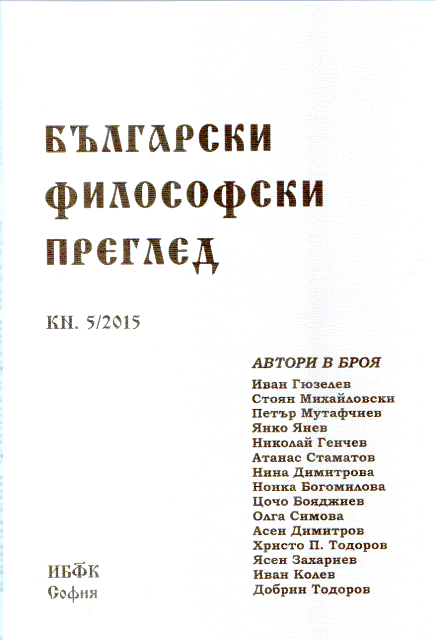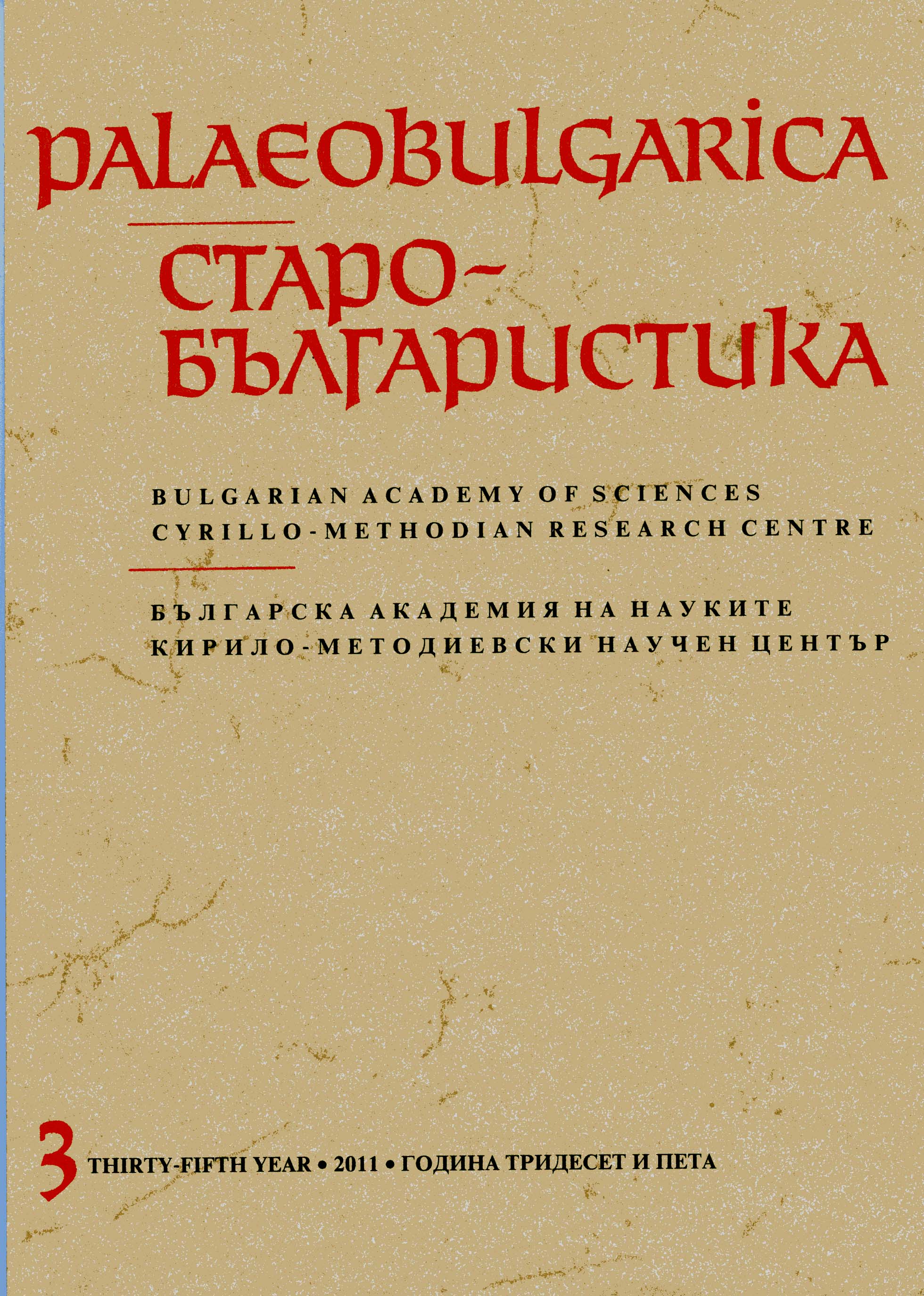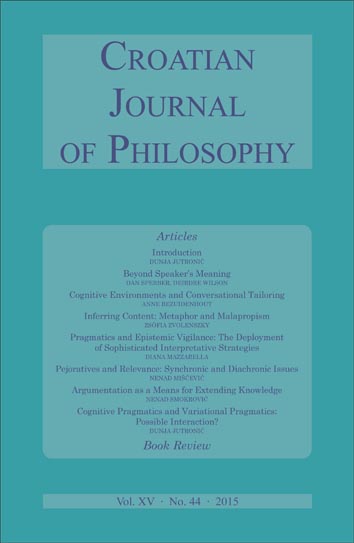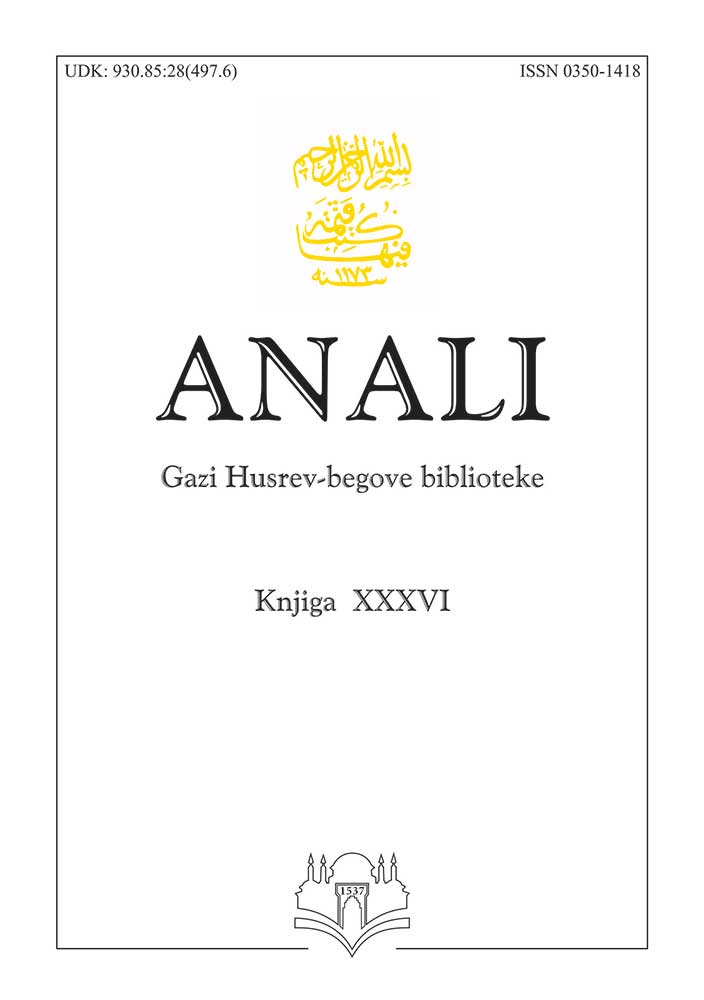
Towards the Philosophy of Bulgarian History. Visantism in Medieval Bulgaria
КЪМ ФИЛОСОФИЯТА НА БЪЛГАРСКАТА ИСТОРИЯ. ВИЗАНТИНИЗМЪТ В СРЕДНОВЕКОВНА БЪЛГАРИЯ
Keywords: philosophy; Visantism; Bulgaria
More...
Keywords: philosophy; Visantism; Bulgaria
More...
Keywords: cosmopolitan democracy; constitutionalism
In this article, I shall investigate the way in which David Held justifies the idea of cosmopolitan democracy by trying to eliminate the tension between the basic principles of constitutionalism and democracy. The study is based on a number of comparisons to the classical conceptions of constitutionalism and democracy in the modern age, as well as on comparisons to the theories of other authors, who approach the problems of extending democracy beyond national borders and at the same time „deepening“ democracy by the application of democratic principles in all domains of social life. My objective is to delineate the change in the substance of the main concepts, to identify the new ideas presented through these concepts and, on this basis, to evaluate the normative grounding of the project of cosmopolitan democracy.
More...
Additional fragments of Festal Menaion BAN № 23 have been discovered in the archives repository of the Bulgarian Academy of Sciences № 52 (the Yordan Ivanov's repository) in archival unit № 280a. Together with another unit - № 280 - they contain a considerable number of MS fragments. Archival unit 280a has parchment and paper fragments from 16 different books (4 on parchment and 12 on paper). The 23 fragments belonging to BAN № 23 are a small part of the fragments that have been lost. From the two initial gatherings I found six fragments. These fragments contain part of the service for the Nativity of the Mother of God, the entire service for Joachim and Anna, and the beginning of the service for the Presentation of the Mother of God in the Temple. I could attribute 11 further fragments belonging to the body of the manuscript. Among them is also a part of the text of the Canon for Theophany discovered by G. Popov. Another six fragments come from the final part of the book (the end of the Service for the Uncovering of the Head of John the Forerunner, the service for the Forty Martyrs from Sebaste, and the paroemias for the Feast of the Annunciation). Without changing fundamentally what we already know from the manuscript, the newlydiscovered fragments (besides filling part of the textual gaps) allow for some important corrections - it becomes clear that festal menaion BAN № 23 was not restricted to the first half of the year as it contains services also for the summer half-year. It is possible that BAN № 23 covered the entire church year and that for the March-August period it contained texts for the most important feasts only. A full description of the ms, including the fragments, is necessary. Such a description will help us to classify it (on the basis of its content) as belonging to the group of the menaia that include also vitae from the synaxarion and it will help us also to obtain a clearer view of the sources of its unique content, which brings together original hymnographic and hagiographic texts both from the 9th—10th cc and from the Tarnovo tradition.
More...
The article compares two texts produced in the course of Christianization of Bulgaria and Saxony. A comparison of these texts provides a new perspective on the missionary approaches of Western and Eastern missionaries to the task of Evangelization and thus illuminates the differences in the outcomes of these Christianization processes. By examining the Saxon Heliand and the Bulgarian Didactic Gospel, the author aims to demonstrate how the different approaches to the missionary undertaking shaped Christianity in Eastern and Western Europe.
More...

The article deals with the peculiarities of the Calendar in the fourth book printed by Yacob Kraykov, called "Various readings" and considered to be functionally identical to the miscellanies for travellers, generally associated with Bozidar Vucovichs printing activity in Venice at the beginning of the 16th century. This Venetian edition is an absolute rarity since only 4 copies have been preserved. However, a focused and in-depth study of the history of this book in the Slavonic tradition has not yet been conducted. There is no facsimile edition or digitalized copy to make available to a larger scholarly community its diversified text composition that has no analogues in the overall printed tradition. Only the apocryphal part has been published by Y. Y. Capaldo in the late 80th. The Calendar is not included. The article focuses on the text as a whole, discussing the issue of holiness, conceived as a complex mixture of Orthodox canonic patterns and legendary oral culture. Together with the Calendar, another text is analysed in depth, viz. the so-called Legend of how many relics of saints the town of Venice possesses. The Venetian miscellany contains unique details of a legendary character about Bulgarian history and geographical names linked to popular sacred places for religious cults in the region of Western Macedonia populated by Bulgarians. It bears traces of the self-consciousness of its compiler, which stood out against the background of the predominantly expressed common Orthodox identity. The author claims that these questions are the key to the central problem the sources of the printed book and the role of the printer himself in its composition and literary message. The article is based on the first complete copy of the book from the holdings of the Leiden University Library in Holland. The Library authorities kindly permitted its analysis for scholarly purposes.
More...


The manuscript no. 741 of the National Archive in Bucharest, partially damaged, is a miscellanea described as written in the 16th с and containing Old and New Testament "apocryphal texts", popular pseudocanonical literature, homilies by St John Chrysostom, as well as the palaea historica and a text similar to the palaea interpretata. Among the texts in the manuscript there is a copy of Pseudo-Methodius of Olympos' Apocalypsis (ff. 33v-60v). Different variants and redactions of the text have been published at least (in whole and in fragments) ten times since the first edition by N. S. Tikhonravov in 1863. However, it should be emphasized, that - apart from V. M. Istrin in the last decades of the 19th с - only contemporary scholars have paid particular attention to this literary monument of Medieval times. So far three Slavic translations have been pointed out, and two of them can be attributed to the production of the Preslav literary school in the times of the First Bulgarian Empire. The first translation, acknowledged as a 'free' one, comes from the 9th - 10th c; the second, originating also in the 10th c. (tsar Peter's times), is called 'a literal translation'; the third is dated to the first half of the 14th с Apart from that, 'combined, mixed' variants are said to have originated on the basis of the first translation. At the same time, new editions of newly discovered copies are published; the most important seems to be the second translation, published by F. J. Thomson in 1985, from the ms. Copenhagen 149. However, the Apocalypsis from the ms 741 is an unknown type of the text. In general, it looks like originating from the same source as the first Slavic translation, but it's not similar to any of the variants published up to now. It is characterized by many differences - mostly in syntax, but it also shows some lexical peculiarities. Moreover, ms 741 contains two fragments not recorded in other variants. While the first one is a description of the devil, or maybe of polytheism personalized, the second is a very specific story of Melchisedec, familiar rather from old Syriac or Greek narratives (as in The Cave of Treasures) about the patriarch. It is difficult to explain the many peculiarities of the text - are they the result of the copyist's ingeniousness, or an effect of copying from an unknown protograph of the Apocalypsis, or is it even a new translation? It seems reasonable to describe the copy of the Apocalypsis in the ms 741 as an unknown variant of this text, and this is the reason for a critical edition of it with variant readings from two other copies that are textologically most similar (Istrin's edition and a 16th с copy from the Serbian National Library in Belgrade, no.40,ff. 195-226v).
More...




Keywords: Communication, showing vs telling, paraphrasability, manifestness, ostension.
Our main aim in this paper is to show that constructing an adequate theory of communication involves going beyond Grice’s notion of speaker’s meaning. After considering some of the diffi culties raised by Grice’s three-clause defi nition of speaker’s meaning, we argue that the characterisation of ostensive communication introduced in relevance theory can provide a conceptually unifi ed explanation of a much wider range of communicative acts than Grice was concerned with, including cases of both ‘showing that’ and ‘telling that’, and with both determinate and indeterminate import.
More...
Keywords: Cognitive pragmatics, relevance theory, variational pragmatics, sociolinguistics, urban dialectology, salience.
In this paper I attempt to look into a possible way in which cognitive pragmatics can help out variational studies in explaining the processes of language change. After broadly setting the scene this article proceeds by giving basic information about variational pragmatics. Then it concentrates on Sperber and Wilson’s relevance theory and its possible interaction with social sciences, namely its possible application in sociolinguistics. I next present my own research of Split (urban) dialect/ vernacular change where I concentrate on explanatory side, asking which explanation would be the best one for the changes of some variables in the dialect. The interpretation and discussion of the fi ndings preceed the discussion of salience as the explanatory tool for language change as seen from cognitivists and variationists with the hope that such discussions can bring closer cognitivists, i.e. relevantists, to sociolinguists, i.e. variationists.
More...
Keywords: Ad hoc concepts, fi gurative language use, inferential comprehension procedures, linguistic error, literal language use, literal–metaphorical continuum, loose use, malapropism, metaphor, relevance the
It is traditionally thought that metaphorical utterances constitute a special—nonliteral—kind of departure from lexical constraints on meaning. Dan Sperber and Deirdre Wilson have been forcefully arguing against this: according to them, relevance theory’s comprehension/interpretation procedure for metaphorical utterances does not require details specifi c to metaphor (or nonliteral discourse); instead, the same type of comprehension procedure as that in place for literal utterances covers metaphors as well. One of Sperber and Wilson’s central reasons for holding this is that metaphorical utterances occupy one end of a continuum that includes literal, loose and hyperbolic utterances with no sharp boundaries in between them. Call this the continuum argument about interpreting metaphors. My aim is to show that this continuum argument doesn’t work. For if it were to work, it would have an unwanted consequence: it could be converted into a continuum argument about interpreting linguistic errors, including slips of the tongue, of which malaprops are a special case. In particular, based on the premise that the literal–loose–metaphorical continuum extends to malaprops also, we could conclude that the relevance-theoretic comprehension procedure for malaprops does not require details specifi c to linguistic errors, that is, details beyond those already in place for interpreting literal utterances. Given that we have good reason to reject this conclusion, we also have good reason to rethink the conclusion of the continuum argument about interpreting metaphors and consider what additional (metaphor-specifi c) details—about the role of constraints due to what is lexically encoded by the words used—might be added to relevance-theoretic comprehension procedures.
More...
Keywords: Pragmatics, epistemic vigilance, deception, misunderstanding.
Sperber (1994) suggests that competent hearers can deploy sophisticated interpretative strategies in order to cope with deliberate deception or to avoid misunderstandings due to speaker’s incompetence. This paper investigates the cognitive underpinnings of sophisticated interpretative strategies and suggests that they emerge from the interaction between a relevance-guided comprehension procedure and epistemic vigilance mechanisms. My proposal sheds a new light on the relationship between comprehension and epistemic assessment. While epistemic vigilance mechanisms are typically assumed to assess the believability of the output of the comprehension system (Sperber et al. 2010), I argue that epistemic assessment plays an additional role in determining this very output.
More...
Keywords: Argumentation, evolutionary psychology, knowledge, safety.
In this paper I am developing the theses that argumentation is a means for extending knowledge. The theses are founded on two focal points:1. Reasoning is designed for argumentation, and 2. Argumentation process is an exceptionally successful media that provokes usage of methods reliable for the extension of knowledge. The fi rst point relies on Sperber’s and Mercier’s evolutionary psychological approach to argumentation which I consider the most convincing theory in the fi eld. Taking this ground as a departing point, the goal of the paper is to broaden this approach with epistemological insights that I base on Williamson’s safety theory of knowledge.
More...

Keywords: Istono blago; Ljubušak; Turkish proverbs; language; morphonology;morphology;
The previous work focused on phonological entries in the Turkish text of proverbs and wisdom sentences produced by Mehmed-bey Kapetanovi- Ljubušak both in original Arabic lettering and in Latin script; published in Istono blago (Eastern Treasure) magazine in 1896 in Sarajevo. This second paper discusses morphonologic and morphologic features of Turkish language. It presents the forms of grammatical and formative morphemes; and points out that some of their characteristics reflect the Turkish language used in Bosnia over past centuries.
More...